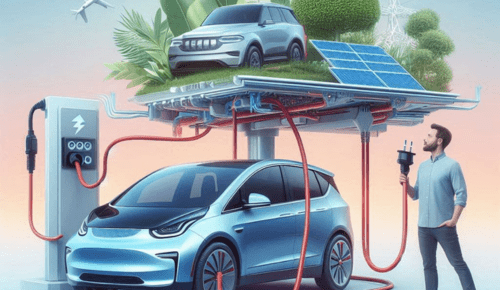Buying an electric vehicle is exciting, but is your home’s electrical system ready to support it? Installing an EV charger isn’t as simple as plugging it in—your panel, wiring, and circuits all play a role in handling the extra demand. Before moving forward, homeowners should understand whether their electrical system is equipped for the job or if upgrades are needed.
Is Your Electrical Panel Ready for the EV Charging Surge?
Your electrical panel is the heart of your home’s power system, distributing electricity to various circuits. But is it prepared to handle the additional load of an EV charger? Many older panels were designed before the rise of high-powered home chargers, meaning they might lack the capacity needed for efficient and safe operation. If your panel is already maxed out with existing appliances, adding an EV charger could lead to overloads, frequent tripped breakers, or even electrical hazards.
Upgrading an electrical panel can ensure your home has the power necessary for modern demands. A professional offering electrical services near you can assess your current panel and determine if a higher-capacity upgrade is required. Newer panels can distribute electricity more effectively, reducing strain on circuits and ensuring your EV charger runs without issues. If you’re searching for an electrical contractor near you in Huntsville AL to assess your panel, now is the time to do it before plugging in your new vehicle.
Hidden Wiring Limitations That Could Impact Your Charger Installation
Behind your walls, hidden wiring determines how efficiently electricity flows throughout your home. Most homes built decades ago were not wired with EV chargers in mind, meaning they may have limitations that could slow charging speeds or create potential safety issues. If the wiring cannot handle the increased current, overheating, damaged insulation, or even electrical fires could become real risks.
Electrical companies near you can inspect your home’s wiring to determine whether it meets the necessary standards for an EV charger. If rewiring is needed, it’s best to have it done by professionals to ensure safety and compliance with modern electrical codes. The right wiring can make a huge difference in how quickly and efficiently your electric vehicle charges. Without an upgrade, you may find yourself dealing with frustrating slow charge times or, worse, electrical hazards.
Will Your Existing Circuits Struggle Under Increased Power Demand?
Adding an EV charger means adding another high-powered device to your home’s electrical load. If your home already has appliances like an HVAC system, water heater, or large kitchen equipment running, your existing circuits might struggle to handle the extra demand. A single overloaded circuit can cause frequent power interruptions, tripping breakers, or even lead to damaged appliances.
Electrical companies near Huntsville AL can evaluate your home’s electrical load to see if new circuits need to be installed. If your system isn’t equipped to handle the power draw of an EV charger, it could mean rerouting certain appliances to different circuits or even installing a dedicated circuit for the charger. This ensures a steady flow of electricity without impacting other essential appliances. Investing in a properly structured electrical system makes daily life smoother and keeps everything running efficiently.
Voltage Capacity Checks Before Plugging in Your EV Charger
Before installing an EV charger, checking your home’s voltage capacity is essential. Most household electrical systems operate at 120V or 240V, but not every home is set up to handle the higher voltage required for fast charging. A charger running on insufficient voltage will take significantly longer to charge an electric vehicle, making it inconvenient for daily use.
Hiring an electrical contractor near you to test your voltage capacity can help you determine whether upgrades are necessary. Many EV chargers require a dedicated 240V circuit for optimal performance, which might not be available in older homes. If your home’s voltage supply is outdated, an upgrade may be needed to improve efficiency and provide consistent charging power. Ensuring the correct voltage from the start prevents unnecessary delays and maximizes your EV’s performance.
Do Older Homes Need Electrical Upgrades for EV Chargers?
Older homes were never designed for the kind of power demands that modern electric vehicles require. Many still have outdated fuse boxes, lower-capacity wiring, or insufficient circuits to handle an EV charger without strain. If your home was built decades ago, it’s important to check whether it can handle the additional load before plugging in an electric vehicle.
Electrical services in Huntsville AL can help assess whether an older home needs an upgrade to accommodate a high-powered EV charger. This could mean replacing outdated breaker panels, installing new wiring, or even upgrading your entire electrical system to meet today’s energy demands. Without these upgrades, an older home’s wiring may not only slow down charging times but also increase the risk of overheating and electrical malfunctions.
Warning Signs Your Electrical System Isn’t Ready for High-Powered Chargers
Some homeowners don’t realize their electrical system isn’t prepared for an EV charger until problems arise. Flickering lights, frequently tripped breakers, or buzzing sounds from outlets can all indicate that the system is struggling under the demand. Ignoring these signs could lead to power failures or even fire hazards if the wiring becomes overheated.
If your home experiences any of these warning signs, it’s time to look for an electrical contractor near you to inspect your system. A professional can identify whether your electrical setup needs adjustments before installing an EV charger. Preventing issues before they occur is always better than dealing with unexpected electrical failures, so a thorough inspection is a wise step before upgrading your home with an EV charging station.




